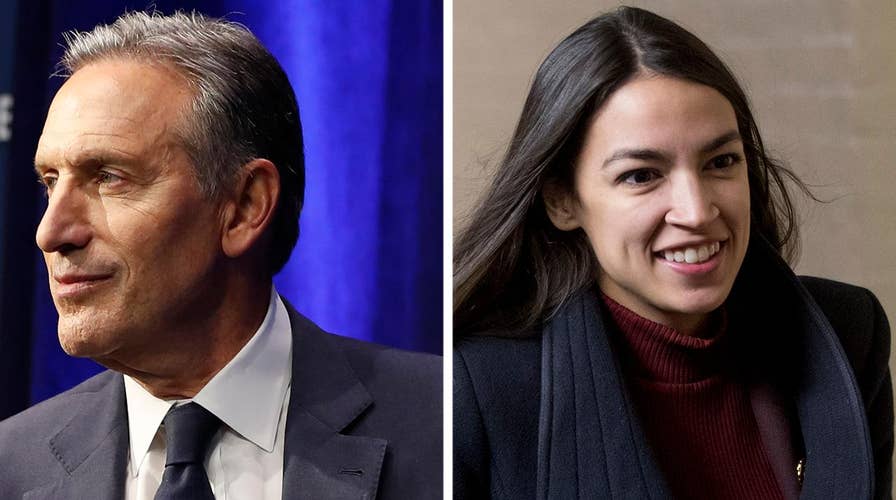Howard Schultz on Ocasio-Cortez: There is a problem shes identified but...she's a bit misinformed
Former Starbucks CEO speaks at a Barnes and Noble book discussion event after teasing a 2020 presidential run as an independent.
Two seemingly unrelated events from the weekend offer a useful window into the state of politics in 2019 and beyond.
First, former Starbucks CEO Howard Schultz made a splash on CBS’s 60 Minutes when he announced he is considering a 2020 presidential bid. These days, you can’t swing a dead cat without hitting a White House wannabe – it seems as though more people are running than aren’t.
But there is one thing that separates Schultz from all the others: He said he would run as an independent.
IF YOU'RE A DEMOCRAT RUNNING FOR PRESIDENT, AN APOLOGY IS THE TICKET TO THE STARTING GATE RIGHT NOW
With the exception of George Washington, no presidential candidate in American politics has succeeded without the backing of a major political party. From Theodore Roosevelt to Ross Perot to Ralph Nader, third parties have acted as a spoiler by stealing voters from the party with whom they most closely identify.
The backlash against Schultz was swift, severe and came from all sides. Julian Castro, whose nascent presidential campaign has been overshadowed, called it Donald Trump’s “best hope of getting reelected."
With the exception of George Washington, no presidential candidate in American politics has succeeded without the backing of a major political party. From Theodore Roosevelt to Ross Perot to Ralph Nader, third parties have acted as a spoiler by stealing voters from the party with whom they most closely identify.
Former New York City Mayor Michael Bloomberg, now eyeing a run as a Democrat after declining to run as an independent in 2016, agreed, tweeting that Schultz would “split the anti-Trump vote and end up re-electing the President.”
Even Schultz’s hometown Washington state Democratic Party got in on the action, tweeting out a picture of a Starbucks cup inscribed with the words “Don’t do it Howard.”
While some of the criticism from potential competitors is self-serving politics, Bloomberg’s voice should be taken seriously. In 2016, he took a long look at the path that his fellow billionaire Schultz is now considering, and concluded that it wasn’t a viable one. It’s difficult to see what has changed in terms of ballot access and electoral college votes since then.
The uproar caused by Schultz brings us to the second news item from the weekend that’s getting less attention at the moment but is of greater long-term importance. Yahoo News broke the story that Sen. Bernie Sanders’, I-Vt., presidential announcement is “imminent.”
With or without an official campaign, Sanders’ presence was always going to be felt in 2020. Four years ago, many of the policies he pushed, such as free health care and free college education for everyone, were viewed as pie-in-the-sky and unrealistic. His platform was a wish list for bleeding hearts with zero chance of becoming law.
The rise of Sanders has pushed any middle-of-the-road policies out of the Democratic tent. Even a self-described lifelong Democrat who embraces a progressive platform on most issues (i.e. Schultz) can’t find a home in the party of Thomas Jefferson.
To the surprise of everyone, Sanders won more than 12 million Democratic primary votes running under a socialist label.
Now, his policies are not only mainstream, but they are also requirements to be competitive in today’s Democratic Party. One of the party’s bright new stars, Rep. Alexandria Ocasio-Cortez, D-N.Y., identifies as a “democratic socialist.” She echoes Sanders’ calls to remake the American economy away from capitalism and into Scandinavia’s socialism.
It seems counterintuitive, but there is a connection between Schultz, a polished former CEO of one of America’s most recognizable brands, and Sanders, a rumpled and gruff grandfatherly-like figure from Burlington, Vermont.
The rise of Sanders has pushed any middle-of-the-road policies out of the Democratic tent. Even a self-described lifelong Democrat who embraces a progressive platform on most issues (i.e. Schultz) can’t find a home in the party of Thomas Jefferson.
Consider some of his talking points from his 60 Minutes interview. When asked about health care, Schultz called the Democrats’ proposal “as false as the wall” and something “the country cannot afford.”
Schultz’s statement is correct. Sanders’ “Medicare for all” carries an estimated price tag of $32 trillion. Even former Obama era officials are sounding the warning bell and urging a more pragmatic approach. But try using that defense on a Democratic primary debate stage in Iowa or New Hampshire, and you’d get booed all the way back to Seattle.
CLICK HERE TO GET THE FOX NEWS APP
Schultz also decried “revenge politics,” but revenge is exactly what many of the anti-Trump voters are feeling right now. They still don’t understand how he won. They are divided on almost everything – except their desire to get Trump out of office.
For Schultz 2020, the early reviews haven’t been great. And the long-term outlook isn’t much better.

